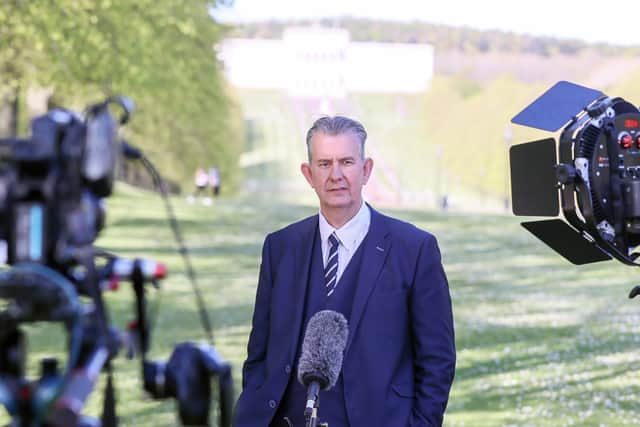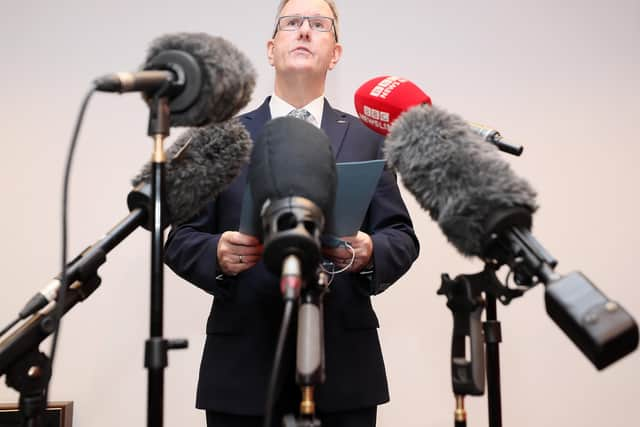Peter Robinson: Unionists have an interest in DUP leadership contest so the candidates should address this wider audience


Next Friday when most people are looking forward to a relaxing and enjoyable weekend, 36 people drawn from every corner of Northern Ireland will travel to Belfast to place their mark on a piece of paper the consequences of which will have an enormous impact on the future of unionism and the Union itself.
A century after Captain James Craig succeeded Edward Carson as the leader of unionism, they will choose who will lead Northern Ireland’s largest party — the present-day voice of unionism — and the party upon whom the obligation lies to clear a pathway out of today’s perilous crises.
Advertisement
Hide AdAdvertisement
Hide AdMuch has been made of the small number of members of the DUP who will take that momentous decision and in truth it is a mechanism that at a first and superficial glance appears at best puzzling.


In reality it is an internal matter for the DUP to decide how they elect their leader and historically the party has avoided the divisive practice of even having a contest.
It has been less important and less of an issue on previous occasions as the new leaders were, in policy terms, essentially seen as ‘continuity’ candidates.
Yet, on this occasion, we all sense change is central to the intention of both candidates. It is also recognised that the individual elected will be more than the DUP leader, he will be playing the main role during a decisive period in the life of unionism.
Advertisement
Hide AdAdvertisement
Hide AdThe unionist public will be looking for someone to present the unionist case and strengthen our link with Great Britain. They will know that this task is not one that can be left for some unspecified time in the future. You cannot fatten a cow on market day.


No one should be surprised if the wider unionist family feel they have skin in the game and while it is impossible to widen out the electoral college it is incumbent on the candidates to publicly address this wider audience and convince those they will later rely on for support that they are worthy of their trust.
We all know that while past behaviour is an indicator of future performance it can be deceptive. Leadership and the heavy burden that it carries can be transformative.
No matter who ascends the throne they may either staunchly step-up or spectacularly stumble. Power may see a leader take decisions hastily rather than thoughtfully and judiciously.
Advertisement
Hide AdAdvertisement
Hide AdWhat would be highly dangerous would be the insertion of peaky blinders manoeuvres into a party contest. Organised third-party social media attacks, negative briefings and fake information should have no part of a contest between colleagues.
There are sadly early signs of the deployment of such tactics.
While it was no real shock that there were members who felt it was time to see new leadership the brutal and publicly humiliating manner of Arlene’s dismissal will, on its own, have created difficulties for a new leader trying to unify the party.
Yet, the debris left on the landscape if the campaign is conducted using guerrilla attacks will potentially cause irreparable damage. So real caution is needed.
Advertisement
Hide AdAdvertisement
Hide AdIf not handled properly, differing opinion can lead to division and division can lead to a split. Unionism cannot afford that and may not recover from it.
One thing is clear; this is not a walk-over for anyone – no matter what anyone says. There is no more unreliable an electorate than a slate of serving politicians. There are members who have sworn fidelity to both candidates and some who are so tight-lipped they would make the third wise monkey look like a chatterbox.
I love people using quotes in their articles and columns. I like it a lot less when writers quote themselves. However, I am going to commit the sin of doing just that. Last week I pointed out that the DUP was a democratic party in name and in practice and like any modern-day political party it was a coalition. This is the heart of its success.
The DUP will not be the largest political party if it sheds elements of its support base. There is no viable alternative unionist party capable of gathering support from a wide cross-section of the public.
Advertisement
Hide AdAdvertisement
Hide AdThe DUP from the latter stages of Ian Paisley’s leadership broadened its base and with it the party’s appeal. This necessitates leading the party from the centre of unionism and not its extremes.
Move to the edges and you lop off an important portion of people at the other end of the party spectrum. This is the route to minority status. It’s not rocket science.
If the principle of leading from the centre is important for gaining and keeping party support, it is even more critical for maintaining support for the Union. The retention of the Union is entirely dependant on the widest and broadest level of support – well beyond, but including, those who support, what detractors call, the hard-core old-DUP message.
Nobody should conflate a central unionist stance with a soft unionist stance. When Ian Paisley led the DUP to becoming the largest party it was not on the basis of being soft.
Advertisement
Hide AdAdvertisement
Hide AdOpposition to the Belfast Agreement was the prevailing view within unionism just as opposition to the Northern Ireland Protocol is today. Unionists do not want froth or fudge on matters critical to the Union.
Indeed, I would go further, I do not think that it is regarded as unreasonable that members who feel strongly on moral issues should act in accordance with their consciences. But there are a range of lesser issues where greater flexibility and understanding could be demonstrated.
I suspect that most DUP members, left entirely to their own devices, would come down on the same side on most issues. It is sometimes more about tone, presentation and showing respect and compassion.
• Peter Robinson is a former DUP leader and first minister of Northern Ireland
——— ———
A message from the Editor:
Advertisement
Hide AdAdvertisement
Hide AdThank you for reading this story on our website. While I have your attention, I also have an important request to make of you.
With the coronavirus lockdown having a major impact on many of our advertisers — and consequently the revenue we receive — we are more reliant than ever on you taking out a digital subscription.
Subscribe to newsletter.co.uk and enjoy unlimited access to the best Northern Ireland and UK news and information online and on our app. With a digital subscription, you can read more than 5 articles, see fewer ads, enjoy faster load times, and get access to exclusive newsletters and content. Visit https://www.newsletter.co.uk/subscriptions now to sign up.
Our journalism costs money and we rely on advertising, print and digital revenues to help to support them. By supporting us, we are able to support you in providing trusted, fact-checked content for this website.
Alistair Bushe
Editor